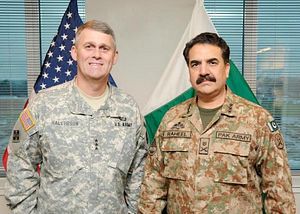A few security-oriented links here at Flashpoints to round off the week:
Pakistan’s Chief of Army Staff General Raheel Sharif will head to the United States for his first official visit. While tensions were high between his predecessor, General Ashfaq Parvez Kayani and U.S. leaders, Sharif will likely face a warmer reception amid U.S. perceptions that the Pakistani military has undertaken a good faith effort to fight the Pakistani Taliban in the country’s tribal regions through Operation Zarb-e-Azb. The visit comes shortly after Afghan President Ashraf Ghani met with Pakistani officials. Sharif’s visit to the United States will likely feature detailed discussions about Pakistan’s role in ensuring (or at least not inhibiting) stability in Afghanistan as U.S. and NATO troops prepare to withdraw from the country.
Also, Pakistan has received Russian approval for its bid to purchase Mi-35 Hind helicopters to replace its aging AH-1F Cobras. According to Defense News, the latter need replacement partly due to their overuse in the ongoing campaign against the Pakistani Taliban. The deal could mark the start of a trend toward closer defense ties between Russia and Pakistan.
The China Aerospace Science and Industry Corp. (CASIC) recently unveiled a model of its FT-1 solid launch vehicle which it claims is intended for emergency satellite launches. Defense News captures the key question raised by the unveiling: “The unanswered question by CASIC representatives is why anybody would need to make an emergency launch of a small satellite using a road-mobile trailer truck.”
Also, at the Zhuhai airshow this week in China, most attention was focused on the Shenyang J-31 — China’s answer to the United States’ F-35 and other fifth-generation stealth fighters. Beijing also announced other platforms, including its first amphibious unmanned aerial vehicle (UAV), the S100. It also unveiled a stealth UAV, the WJ-500.
The Wall Street Journal covers the start of the G-20 conference in Brisbane, Australia this weekend, pointing out tensions between a united U.S., Japan, and Australia, and China. The U.S. will likely use the opportunity of the conference to urge broader security cooperation between Australia and Japan — two countries that are already independently ramping up their diplomatic ties amid growing anxiety over China’s rise.
Finally, Harsh V. Pant is the latest to join our growing roster of Flashpoints columnists. His first column took a look at how India’s new government under Narendra Modi is systematically dismantling India’s historic foreign policy stance of non-alignment and replacing it with a more bold and activist foreign policy. Keep an eye on Flashpoints for more South Asia-focused security analysis from him.
































